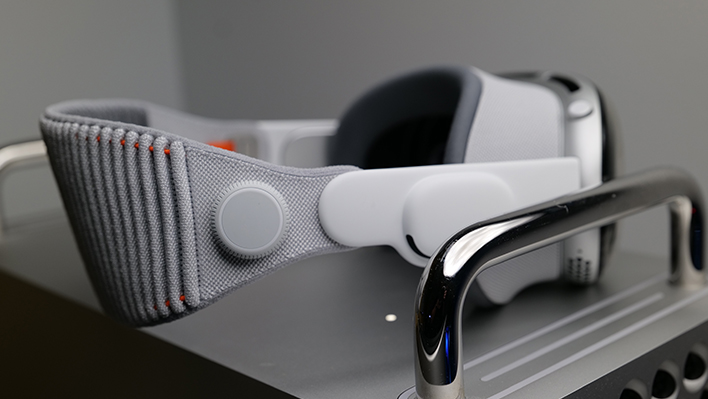Zuckerberg Slams Apple Vision Pro Again In Totally Unbiased Quest 3 Comparison

The Apple Vision Pro has certainly made a splash in the world of virtual reality and spatial computing. If you are Mark Zuckerberg, head of one of the main competitors for this product (albeit a different class), it is an item of extreme interest. While the $3,499 MSRP of the Apple Vision Pro has kept it in rarified air for most users, the $499 MSRP Meta Quest 3 has been more attainable. Based on price alone, one would assume the Vision Pro is the far superior headset, right? Well, not according to Zuckerberg.
According to a recent post on Threads, Zuckerberg said he believes that the Meta Quest 3 is a superior product to Apple's offering. "We're saying Quest is better", says Zuckerberg.
He then outlines where he feels he can validate that statement. First, he believes that weight is a significant issue, pointing to how the Vision Pro is very hefty. Secondly, he points to the motion blur issue that users have experienced on Vision Pro. Lack of precision inputs, especially those aided by controllers that the Meta Quest 3 has, is also an important aspect for Zuckerberg.
Ultimately, he feels that to achieve the higher resolution inherent within the Apple Vision Pro, too many sacrifices to usability had to be made to maintain that standard. As an owner of the Meta Quest 2 and Apple Vision Pro, some of what he says certainly has validity, but it ignores the forward nature of Vision Pro.
There are a myriad of ways to deal with the heft and comfort, as Apple provides a variety of bands and light seals to make sure it can be as comfortable as possible. Motion blur or the use of the hands to interact with the device, while not always ideal, certainly is not a deal-breaker for many. It is true that the Vision Pro is built out of fancy materials, and sometimes that can be prone to the front cracking or other unexpected side-effects of the new technology.
Apple does benefit from a large and loyal fan base, who are more likely to put up with the shortcomings of Vision Pro since it integrates within the existing Apple ecosystem of devices.
The reality is that both Meta and Apple have had some stumbling blocks in getting mass adoption of its virtual reality headsets. While the approach is certainly different from each company, users still are reluctant to wear a headset for long periods of time or for productivity. It remains an interesting novelty for those who want to experience what the next generation of spatial computing may bring. All current devices, including the Meta Quest 3, deal with compromises in this regard.
Apple would likely agree with Zuckerberg that the overall price has to be less, as that is an immediate deterrent for many. When that hurdle is overcome, then mass adoption of this type of technology can truly begin to take hold.
According to a recent post on Threads, Zuckerberg said he believes that the Meta Quest 3 is a superior product to Apple's offering. "We're saying Quest is better", says Zuckerberg.
He then outlines where he feels he can validate that statement. First, he believes that weight is a significant issue, pointing to how the Vision Pro is very hefty. Secondly, he points to the motion blur issue that users have experienced on Vision Pro. Lack of precision inputs, especially those aided by controllers that the Meta Quest 3 has, is also an important aspect for Zuckerberg.
Ultimately, he feels that to achieve the higher resolution inherent within the Apple Vision Pro, too many sacrifices to usability had to be made to maintain that standard. As an owner of the Meta Quest 2 and Apple Vision Pro, some of what he says certainly has validity, but it ignores the forward nature of Vision Pro.
There are a myriad of ways to deal with the heft and comfort, as Apple provides a variety of bands and light seals to make sure it can be as comfortable as possible. Motion blur or the use of the hands to interact with the device, while not always ideal, certainly is not a deal-breaker for many. It is true that the Vision Pro is built out of fancy materials, and sometimes that can be prone to the front cracking or other unexpected side-effects of the new technology.
Apple does benefit from a large and loyal fan base, who are more likely to put up with the shortcomings of Vision Pro since it integrates within the existing Apple ecosystem of devices.
The reality is that both Meta and Apple have had some stumbling blocks in getting mass adoption of its virtual reality headsets. While the approach is certainly different from each company, users still are reluctant to wear a headset for long periods of time or for productivity. It remains an interesting novelty for those who want to experience what the next generation of spatial computing may bring. All current devices, including the Meta Quest 3, deal with compromises in this regard.
Apple would likely agree with Zuckerberg that the overall price has to be less, as that is an immediate deterrent for many. When that hurdle is overcome, then mass adoption of this type of technology can truly begin to take hold.


